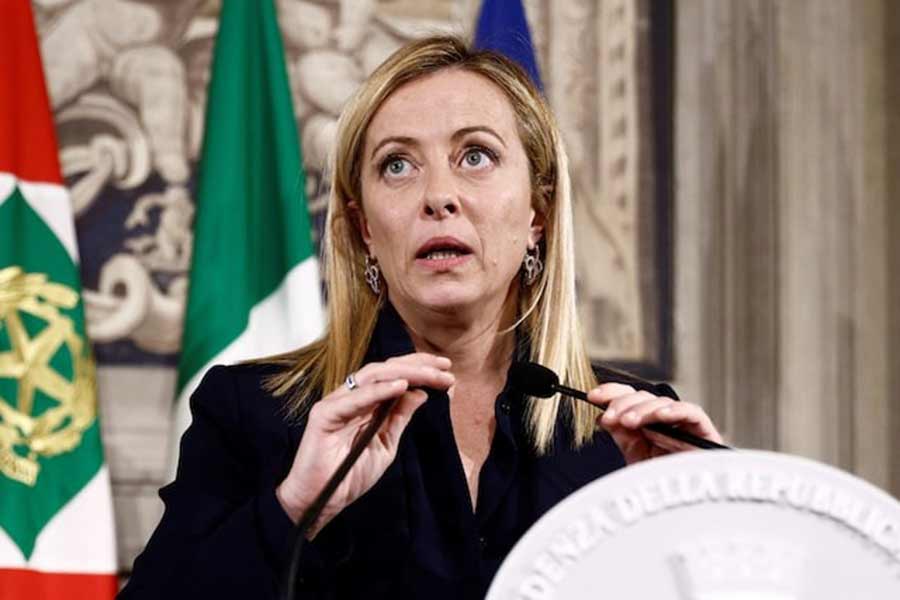‘Criminal gangs trafficking illegal Bangladeshi immigrants into Italy’
Says Italian Prime Minister Giorgia Meloni

Published :
Updated :

Italian Prime Minister Giorgia Meloni has accused ‘criminal gangs’ of exploiting Italy’s visa system to traffic illegal Bangladeshi immigrants into the country.
The prime minister issued an official notification highlighting the need to curb the smuggling of illegal immigrants in a cabinet meeting recently.
“The commitment of the entire government has so far allowed us to reduce illegal entries by 60 percent this year. However, an organised crime group has infiltrated the visa application process. They are abusing our legal entry decrees for people who would otherwise not be able to enter the country,” said Meloni.
The head of the government cited that Bangladesh tops the list for illegal immigration to Italy according to the data collected from January to May 2024.
“Work visas are being sold from €12,000 to €15,000”, said Meloni.
“We have also received information about human trafficking and illegal sales of work visas. Some organised criminal groups in Bangladesh and Italy create anonymous companies that exist only on paper,” she added.
Italy announced in 2022 that it would take in a large number of immigrant workers in an attempt to limit its labour shortage. This was done in the hopes of further limiting illegal immigrants from entering the country.
Nearly 5 million workers from 33 non-EU countries applied for legal work visas during the first and second phases of the application process from 2023 to 2025.
However, the majority of these workers have not worked under their specified employers after being permitted entry to the country. As such, after a certain period, they become illegal immigrants.
Of them, the number of illegal Bangladeshi workers is the highest.
Last week, Prime Minister Giorgio Meloni issued a directive to stop the entry of illegal immigrants into Italy.
In 2023, around 136,000 workers were expected to enter Italy under a work visa. But about 282,000 applied for it.
“However, 157,000 of these applications were for Campania alone, and another 20,000 for Puia, even though only 12 per cent and 6 per cent of the companies are owned by Italians respectively,” she added.
According to the data, only 3 per cent of the workers who entered Campania in 2023 work under employers while the remaining 97 per cent remain in the region as illegal immigrants.
Italy’s anti-Mafia prosecutor said, “We will be strictly monitoring the entry of workers to Italy from now on. We will work against all types of human trafficking and verify the existence of every company mentioned before allowing workers entry to the country.”
According to a survey conducted by Italy's Ministry of Home Affairs, Bangladeshi citizens entered Italy both legally and illegally in 2024. In the first five months of this year, most Bangladeshis entered illegally by crossing the Mediterranean Sea.
Bangladeshis accounted for 45.4 per cent of the total foreign workers entering the European country in 2022. And in 2024, at least 51.1 per cent of the workers entering Italy are Bangladeshi.
Mahfuzur Rahman, a Bangladeshi expatriate in Italy who works with migrants, said, "The Italian government always tries to bring skilled workers from different countries. However, some agencies and unscrupulous brokers are bringing unskilled workers to Italy for huge sums of money. After they come here, they do not return home even when their specific visa period expires. Many also flee to other countries or live here as illegal immigrants.”
"Selling and buying visas are two illegal activities. Therefore, the prime minister has warned of taking strict action against those involved in these activities. Besides, various measures are being taken to expel illegal immigrants from this country," he added.
Under the circumstances, the Italian ambassador to Dhaka, Antonio Alessandro, has advised Bangladeshi workers to only trust 'reliable agencies' while applying for work visas.
The ambassador said workers must be sure about where they are going to work and under what conditions.
While pointing out that one in five visa applicants provide 'illegal documents', the ambassador said, "There is a practice of paying very large sums of money to middlemen to send them to Italy. This is illegal, which is happening both in Italy and Bangladesh."


 For all latest news, follow The Financial Express Google News channel.
For all latest news, follow The Financial Express Google News channel.